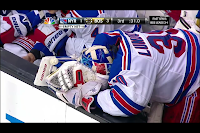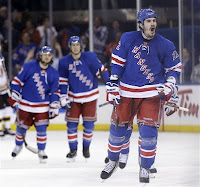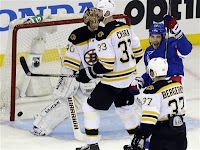Lost amid the celebration that followed the firing of John Tortorella is the fact that these are dangerous times for the New York Rangers. We sit upon the very precipice of long term success or long term failure and the replacement bench boss will have a big say in which way the franchise heads.
Failure, by the way, includes mediocrity - the malady that infected the Blueshirts for season after season in the post-94 era. Sure the team has at least made the playoffs in recent history but, as Vin Scully has said, "good is not good enough when better is expected."
And better is expected. The bar was raised last season and, despite Dolan's virtual disinterest in the Rangers, he does care about his wallet. It is a fat wallet he opened to rebuild the Garden after his mouth ruined hopes of a new building. Nearly a billion bucks have been spent on an aesthetically pleasing, physically uncomfortable remodeling and now it's time to start making money again. They expect to recoup all of that cash in the next five years so where will that revenue come from?
Victory.
Nothing sold the Rangers and nothing sold the sport of hockey like the lone New York championship in the last 73 years. They made it to the Finals three times in the 54 years between Cups and have yet to get that far in the last 19. So there are veeeeerrry narrow windows for success in this town and, for all of the flaws and holes in the lineup, the players that make up the current core of the Big Apple are in or are entering their prime. Either they will take the next step toward Stanley, or they will wither on the vine.
There are no blue chippers coming to camp this fall, no saviours waiting in the wings. Glen Sather cut short the rebuild by buying Richard$ and selling three True Blue and a top pick for Nash, among other moves. Recent draft selections have been projects and are still years away. The kids contained in the current lineup are pretty much all that is in the cupboard and the new coach will have to look through it to figure out what he can make of the shattered pieces left by the last bench boss.
That being said, for all of Glen's failures - and there have been many over the dozen-plus years of his tenure - he has been accommodating of his coaches. Renney took the Czechs as far as they could go and wanted a more North American north-south team so Sather signed Drury and Gomez. Torts wanted familiar foot soldiers he could order around so Sather got Fedotenko and Richard$. So it can be certain that the new shot caller will have the mercenaries he wants to implement his philosophies.
Glen shouldn't hire an old buddy or someone who has some impressive hand writing. Taking someone off the coaching carousel brings expectations and baggage and the best of those candidates haven't had the best history when it comes to the Cup, i.e. Ruff and Vigneault. Speaking of history, it is easy to see Sather going the Gretzky or Messier route - not only are they old friends who had some success in a former life, but they also are 'names' that can sell Dolan on the thought they can sell tickets. Because fans pay to watch the guys behind the bench. /sarcasm
Dave Tippett has a nice track record, and everyone knows Glen's relationship with Phoenix. But who knows if the former Star is interested in leaving the desert.
The rebuild is over but that doesn't mean that young blood can't build this team into a winner. Just as Jeff Gorton has helped refresh the Rangers front office, someone outside of the OBN (Old Boys' Network) needs to bring new ideas behind the bench. Davis Payne and Guy Boucher weren't bad before being undone by abominable goaltending and the AHL guys out there - Dallas Eakins,Mark French (just went to the KHL), Willie Desjardins - have shown signs they can succeed in in the show.
But whoever Sather selects will have little time to implement his strategy. This team needs to win, and soon.
Or else.
Failure, by the way, includes mediocrity - the malady that infected the Blueshirts for season after season in the post-94 era. Sure the team has at least made the playoffs in recent history but, as Vin Scully has said, "good is not good enough when better is expected."
And better is expected. The bar was raised last season and, despite Dolan's virtual disinterest in the Rangers, he does care about his wallet. It is a fat wallet he opened to rebuild the Garden after his mouth ruined hopes of a new building. Nearly a billion bucks have been spent on an aesthetically pleasing, physically uncomfortable remodeling and now it's time to start making money again. They expect to recoup all of that cash in the next five years so where will that revenue come from?
Victory.
Nothing sold the Rangers and nothing sold the sport of hockey like the lone New York championship in the last 73 years. They made it to the Finals three times in the 54 years between Cups and have yet to get that far in the last 19. So there are veeeeerrry narrow windows for success in this town and, for all of the flaws and holes in the lineup, the players that make up the current core of the Big Apple are in or are entering their prime. Either they will take the next step toward Stanley, or they will wither on the vine.
There are no blue chippers coming to camp this fall, no saviours waiting in the wings. Glen Sather cut short the rebuild by buying Richard$ and selling three True Blue and a top pick for Nash, among other moves. Recent draft selections have been projects and are still years away. The kids contained in the current lineup are pretty much all that is in the cupboard and the new coach will have to look through it to figure out what he can make of the shattered pieces left by the last bench boss.
That being said, for all of Glen's failures - and there have been many over the dozen-plus years of his tenure - he has been accommodating of his coaches. Renney took the Czechs as far as they could go and wanted a more North American north-south team so Sather signed Drury and Gomez. Torts wanted familiar foot soldiers he could order around so Sather got Fedotenko and Richard$. So it can be certain that the new shot caller will have the mercenaries he wants to implement his philosophies.
Glen shouldn't hire an old buddy or someone who has some impressive hand writing. Taking someone off the coaching carousel brings expectations and baggage and the best of those candidates haven't had the best history when it comes to the Cup, i.e. Ruff and Vigneault. Speaking of history, it is easy to see Sather going the Gretzky or Messier route - not only are they old friends who had some success in a former life, but they also are 'names' that can sell Dolan on the thought they can sell tickets. Because fans pay to watch the guys behind the bench. /sarcasm
Dave Tippett has a nice track record, and everyone knows Glen's relationship with Phoenix. But who knows if the former Star is interested in leaving the desert.
The rebuild is over but that doesn't mean that young blood can't build this team into a winner. Just as Jeff Gorton has helped refresh the Rangers front office, someone outside of the OBN (Old Boys' Network) needs to bring new ideas behind the bench. Davis Payne and Guy Boucher weren't bad before being undone by abominable goaltending and the AHL guys out there - Dallas Eakins,
But whoever Sather selects will have little time to implement his strategy. This team needs to win, and soon.
Or else.
Big Decision, Big Decision: Navigating Life's Important Choices
Life is a journey filled with choices, both big and small, that shape our paths and determine our futures. From selecting a career path to choosing a life partner, the decisions we make can have far-reaching consequences. While some choices may seem daunting, they also present opportunities for growth, learning, and self-discovery. In this article, we will explore the intricacies of making big decisions, the factors that influence them, strategies for effective decision-making, and address frequently asked questions (FAQs) to help you navigate life's important choices.
Understanding the Significance of Big Decisions
Big decisions are those that have a substantial impact on our lives, often altering the course of our journey in significant ways. These choices can be related to various aspects of life, including:
Career: Choosing a profession, changing careers, or pursuing advanced education.
Relationships: Deciding to marry, divorce, or enter into a long-term partnership.
Lifestyle: Relocating, starting a family, or making major lifestyle changes.
Finance: Investments, major purchases, or financial planning.
Health: Medical treatments, surgeries, or lifestyle changes for health improvement.
Big decisions can be exhilarating and stressful, as they require careful consideration, self-reflection, and the willingness to embrace uncertainty.
Factors Influencing Big Decisions
Several factors play a crucial role in influencing the decisions we make:
Values and Beliefs: Our core values and beliefs shape our decisions, guiding us toward choices that align with our principles.
Emotions: Emotions can sway our choices. Fear, excitement, and anxiety may impact decision-making.
Information and Research: Gathering relevant information, conducting research, and seeking advice can help make informed decisions.
Peer Pressure: Social influences and the opinions of friends and family can sometimes affect our choices.
Goals and Aspirations: Our long-term goals and aspirations often steer us toward decisions that support our desired outcomes.
Risk Tolerance: Our willingness to accept risks can influence whether we make bold or cautious choices.
Strategies for Effective Decision-Making
Making significant life decisions can be challenging, but several strategies can help simplify the process:
Define Your Values: Clarify your core values and principles to ensure your choices align with what matters most to you.
Set Clear Goals: Establish clear short-term and long-term goals to provide direction and purpose for your decisions.
Gather Information: Research and gather relevant data to make informed choices. Seek advice from experts or trusted individuals.
Weigh the Pros and Cons: Create a list of advantages and disadvantages for each option to help visualize the consequences of your decisions.
Consider Your Gut Feeling: Trust your intuition and listen to your inner voice. Sometimes, your instincts can provide valuable insights.
Test Your Assumptions: Challenge your assumptions and biases to ensure they do not cloud your judgment.
Visualize Outcomes: Envision the potential outcomes of each choice to gain a better understanding of their impact.
Manage Fear and Uncertainty: Accept that all decisions come with an element of uncertainty and fear. Embrace these feelings as part of the process.
Seek Support: Discuss your options with trusted friends, family members, or mentors who can offer different perspectives.
Plan for Contingencies: Develop contingency plans to address potential challenges or unexpected outcomes.
FAQs (Frequently Asked Questions)
Let's address some common questions related to making big decisions:
1. How do I overcome fear and anxiety when making a big decision?
It's natural to experience fear and anxiety during significant decision-making. Practicing mindfulness, deep breathing, and seeking emotional support can help alleviate these feelings.
2. What if I make the wrong decision?
It's important to recognize that not all decisions have clear-cut right or wrong answers. Even if an outcome is not as expected, it can lead to valuable lessons and personal growth.
3. How can I prioritize my values when making big decisions?
Start by identifying your core values and referring to them when evaluating choices. Consider how each option aligns with your values and beliefs.
4. Should I always follow my intuition when making decisions?
While intuition can be a valuable guide, it should be balanced with careful consideration and information gathering. Sometimes, decisions require a combination of rational analysis and intuition.
5. Is it beneficial to seek the advice of a professional or counselor when making big decisions?
Yes, consulting with professionals or counselors who specialize in the relevant areas can provide valuable insights and guidance when making significant choices.
Big decisions are an inevitable part of life's journey, and they offer opportunities for growth, transformation, and self-discovery. By understanding the factors that influence our choices, utilizing effective decision-making strategies, and embracing the uncertainty that accompanies significant decisions, we can navigate life's important choices with confidence and resilience. Ultimately, the decisions we make shape our unique life stories and contribute to the richness of our experiences.














